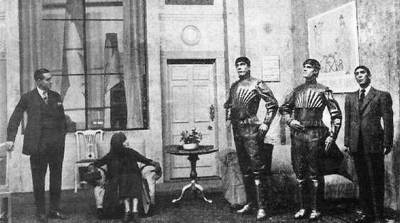| Too Good To Miss - The Word Robot Invented 100 Years Ago |
| Written by Sue Gee |
| Sunday, 13 March 2022 |
|
We are now very familiar with robots - machines that posses artificial intelligence and perform tasks that humans find arduous or simply unattractive. What you might not know is that word robot comes from the Czech for "forced labour". It was first used to mean an artificial humanoid in the stage play R.U.R. written in 1920 by by the Czech author Karel Čapek, which premiered on January 2, 1921. The acronym stands for Rossumovi Univerzální Roboti and translates to English as Rossum's Universal Robots. The robots in R.U.R are not mechanical devices. Instead they are artificial biological organisms that resemble humans and can be mistaken for them. In the recent TV series Humans such creatures were referred to as "synths"; in Battlestar Galactica they were "Cylons" and in Blade Runner they were "replicants". Thanks to genetic engineering the later generations of artificial humanoids were "born" or "grown" whereas Capek's "robots" were assembled a biological kit of parts. The play, which is set around the year 2000, opens in a factory that makes the roboti which are already crucial to the world economy. The crux of the plot is that while at first the robots had been content to work for humans, when more advanced models are created they start to rebel and the outcome of the robot revolution is the extinction of human life. Within two years the play had been translated into 30 languages and was successfully staged in London and a number of cities in the USA. In New York it ran for 184 performances in a production in which Spencer Tracy and Pat O'Brien played robots, making their Broadway debuts. Although critically acclaimed as one of the classic titles of science fiction, it did not find favor with Isaac Asimov, author of I Robot who stated: "Capek's play is, in my own opinion, a terribly bad one, but it is immortal for that one word. It contributed the word 'robot' not only to English but, through English, to all the languages in which science fiction is now written." In fact, Asimov's "Laws of Robotics" (which are discussed here) are explicitly designed to prevent the kind of situation depicted in R.U.R. as they impose a total inhibition against harming human beings or disobeying them. While others credit Karel Čapek, as the author of R.U.R., with coining the term, he insists it was in fact his older brother Josef, best known as a painter, but also noted as a writer and a poet who suggested it. An account of how it happened was published in 1933 telling how the idea for the play occured to Karel Čapek who immediately went to tell his brother about it, finding Josef at his easel paining and was encoraged to write it: "But," the author said, "I don't know what to call these artificial workers. I could call them Labori, but that strikes me as a bit bookish." "Then call them Robots," the painter muttered, brush in mouth, and went on painting. And that's how it was. Thus was the word Robot born. More InformationWho did actually invent the word "robot" and what does it mean? Related ArticlesWe Robot - Call for Conference Submissions European Parliament Votes On Legal Status Of Robots Autonomous Robot Weaponry - The Debate How Will AI Transform Life By 2030? Initial Report Halting Problem Used To Prove A Robot Cannot Computably Kill A Human Survey Reveals American Public Suspicious Of Tech To be informed about new articles on I Programmer, sign up for our weekly newsletter, subscribe to the RSS feed and follow us on Twitter, Facebook or Linkedin.
Comments
or email your comment to: comments@i-programmer.info
|
| Last Updated ( Sunday, 13 March 2022 ) |




